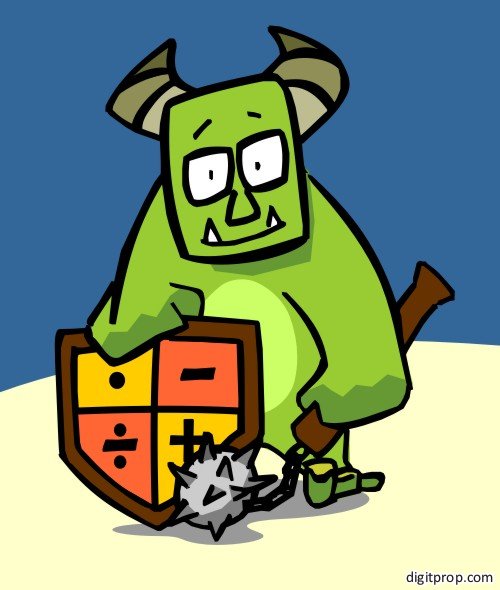Here is a brand new card game I designed, helping you (and your kids) to practice your arithmetic skills. Math monsters is easy to play but challenging, and great fun.
At the moment, I am having Math Monsters professionally printed as a high quality, glossy 55-cards deck. Currently, there is a pre-order phase with a 50% discount, while I wait for the printer to send me the finished decks (which will take until March 10). This button will take you to my Etsy store, where you can currently get the game for 5.90 EUR instead of 11.90 EUR, including shipping (but excluding taxes – Etsy will calculate applicable taxes):
The game comes with 18 monster cards, where each monster presents a math challenge.Take the Approxydragon, for instance:
He wants a number between 400 and 450 – he isn’t very interested in exact details, it seems. Well, how do we give him what he wants? The players draw four gemstone cards each. A gemstone card looks like this:
In order to play, the players take turns and play one of their gemstone cards. They pick one of the three numbers, and add, subtract, divide, or multiply it with the current number – or, if it’s the first gemstone card in play, they simply pick that number as the current number.
Players take turns, updating the current number until it meets the criteria on the monster card. In this case, until the number is between 400 and 450. After playing a gemstone card, players replenish their four gemstone cards by drawing another one from the deck. When the deck is used up, the played gemstone cards are shuffled, creating a new deck.
There are many different monster challenges. Here is a photo of all 18 monsters:
In addition to ranges and specific numbers, challenges include variations such as the total combined age of all players, the current day of the month, or a number >200 with only odd digits.
Here is a typical round of play: The first player draws a monster, in this case The Kraken. She then plays one of her gemstone cards, and picks ’29’:
The next player uses a card with the numbers 1, 2, and 3. He picks ‘3’ and multiplies 29 by it, resulting in 87. Almost there, but we are 2 too high:
The next player uses a card with 6, 7, and 8, subtracing 6 from 87, resulting in 81. Bingo, she has won the monster card and keeps it.
The game ends when all monsters have been captured, and the player with the most monsters wins.
This is a great way for kids to practice their math skills. The game does not just require the ‘played’ math operations, but in order to get anywhere, you need to constantly check your options, mentally adding, multiplying, dividing and subtracting.
Variations
The game can easily be played as solitaire, but also in groups of 2-4 players.
If played in a group, you can choose to play collaboratively, trying to get the required numbers as quickly as possible, or competitively, making it difficult for the next player to get to their goal. In this case, the calculations can become quite complex, as you can multiply to very high numbers and use divisions to get back down to a useful range.
Another variation is to have a player pick as many gemstone cards as they need, one after the other, until they reach the goal. After all monsters have been captured, the player with the fewest needed cards wins the game.
